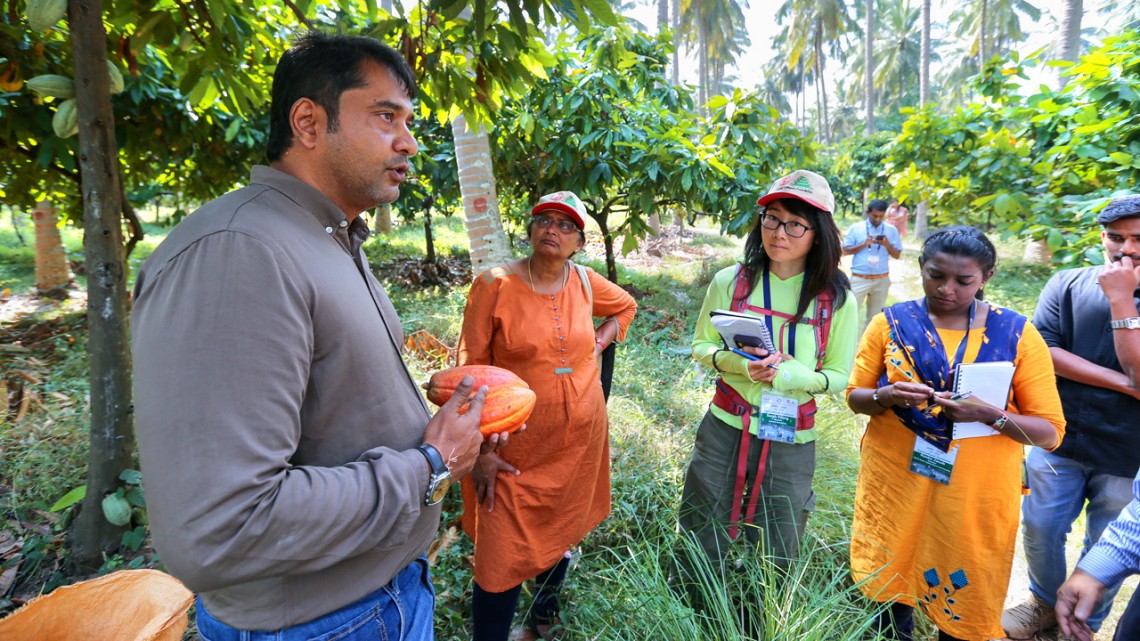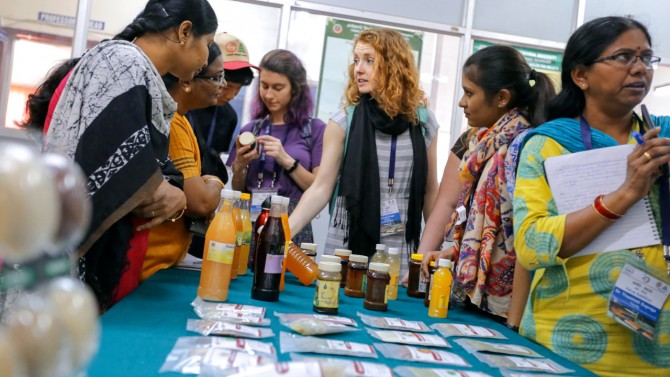
Karthikeyan Palanisamy, left, of Regal Chocolates speaks with IARD students about production and marketing techniques at his pesticide-free cacao farm in India.
Experiential learning program celebrates 20 years in India
By Kelly Merchan
Jessica Snyder ’21 knew she wanted to make an impact in the world. The big question: Where to start?
That question was answered over two weeks in January, as she and 17 other Cornell students – along with a nearly equal number of Indian students – traversed nearly 1,000 miles across India as part of coursework for the International Agricultural and Rural Development (IARD) major. At more than 50 years old, IARD is Cornell’s longest-running experiential learning program.
Students experienced the agriculture systems, rural infrastructure and economic development of the subcontinent.
“This experience was phenomenal,” said Snyder, an IARD major. “Being able to witness what is happening on the ground is a critical first step for us, as students and future professionals, to develop viable solutions that will make a difference in developing countries. That is something that just can’t be found in any book.”
The IARD course launched in 1968 with annual trips to countries around the globe. This year’s trip marked 20 years of partnership between Cornell, Sathguru Management Consultants, the Cornell Sathguru Foundation for Development and universities in India. Since establishing an annual presence in India in 2000, the course has brought together more than 750 Cornell and Indian students for cross-cultural exchange and in-depth experiences on many aspects of development.
“This partnership has endured thanks to excellent partners on the ground,” said Terry Tucker, IARD undergraduate studies director. “India offers a wide range of perspectives and competing ideas in the development sector, which exposes students to a variety of professional track options.”
He said numerous students have maintained contact with partners in India and return for internships and even work opportunities. Program alumni can be found in key positions at the U.S. Agency for International Development and other international development organizations, Tucker said.
This year’s hands-on learning opportunity brought together Cornell students ranging from undergraduates and master’s students to doctoral candidates and Hubert H. Humphrey fellows. In addition, 16 students from four universities in India were sponsored by the Sathguru Foundation to travel to Cornell for a short-term course in the fall, and to take part in the India field trip.
Part of the new Department of Global Development, the IARD course has at its core the philosophy of “education with impact,” by taking lessons out of the classroom and into the field.
“This trip has been an amazing, eye-opening, impactful experience,” said Kamala Eyango ’21, a master of professional studies student in IARD. “I was exposed to extensive knowledge, expertise and people that I never even imagined I would see.”
Students had the opportunity to select one of three specialized tracks: agricultural systems; rural infrastructure; or value addition. Site visits explored diverse cooperative farming systems, agribusinesses, local communities, producers, irrigation schemes and other topics across the state of Tamil Nadu.
“It’s been a life-changing experience,” said Vivekanand Karagi, from the University of Agricultural Sciences, Dharwad, in India. “We are not exposed to our own agriculture systems, even though we live and study in India. Here we’ve been given the chance to learn in our own country and at Cornell, thanks to the Sathguru Foundation, which will push us to improve agricultural systems and yields in India and beyond.”
This course gives both Cornell and Indian students the opportunity for cultural immersion and experiential learning. This year’s participants brought representation and a wealth of knowledge from nine countries, including Bangladesh, Colombia and South Sudan.
“The diversity of students enriched the experience for everyone,” Tucker said. “We are fortunate to bring together a multidisciplinary group from around the world with several different sets of lenses on development issues.”
“This experience has been inspiring for me in every aspect of my career,” said Juan Luis Gonzalez, a doctoral candidate in the field of plant pathology. “My time in India will lead me toward working more passionately in international agriculture in my future.”
Kelly Merchan is a communications specialist in the Department of Global Development.
Media Contact
Get Cornell news delivered right to your inbox.
Subscribe

